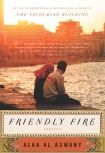Friendly Fire by Alaa Aswany (best e book reader TXT) 📗

- Author: Alaa Aswany
Book online «Friendly Fire by Alaa Aswany (best e book reader TXT) 📗». Author Alaa Aswany
Fate holds our destinies just as the large hand holds the doll—with implacable, inescapable control. It plays with our capabilities and our wishes and it plays with us, and its sole motive for doing so is its excessive love of play—not goodness or justice or truth or any of that stuff—and if it ever were to grasp the sorrows that it causes us, were ever to feel the pain that it inflicts on us, it would hide its face in shame at its doings.
3
Ever since he was a child, he’d loved to draw—people’s faces, trees, the cars in the streets. Everything his eyes saw was imprinted in detail on his young mind. Then the lines he made would run over the paper to re-shape things into the way he wanted to see them. When he reached fifteen, his love of drawing became a problem because he neglected his schoolwork altogether. Every morning, he’d escape from the school and use his pocket money to buy coloring pencils and a sketchbook. Then he’d go to the municipal garden in Zaqaziq, isolate himself on an empty seat, and draw.* His father dealt with him harshly, often beat him, and often hid his pencils from him and tore up his drawings, but none of it was any use: his love of drawing was stronger. When he was twenty, his father died suddenly and that day his fate was decided. The last barrier was broken and he had soon left Zaqaziq, where he had been born, to live in a small room on the roof of an old house in the Bein el-Sarayat neighborhood of Cairo. Before two years had passed, he was drawing the main cartoon for three weekly magazines, and at age twenty-four he put on his first exhibition of oil paintings.
These beginnings were worthy, no doubt, of Ragheb, Bikar, or any other great painter, but I’m not talking about any of them.* These were the beginnings of Abd el-Ati, and who has heard of him? Abd el-Ati was my father, and, despite the exciting, promise-packed start, he ended up far from what was expected. Abd el-Ati did not shine and his great hopes as a painter were never realized. He changed nothing in the development of painting, as he had dreamed of doing, and thirty years after his move to Cairo, my father was still an obscure artist earning his living doing drawings for a magazine called Life that nobody read and getting by on other small jobs, such as supervising the wall newspapers produced at certain schools and giving private art lessons to the children of the rich. This was where Abd el-Ati was at fifty, and I ask myself, why did my father fail? Was he lacking in talent? For sure he had more than many painters who succeeded and became famous. Was it laziness and love of pleasure that did for him? On the contrary, my father spent money on alcohol and drugs only during his last years. Before then, he used to produce prolifically and persistently and when I was little I’d often wake in the morning to find he hadn’t slept but spent the entire night on a new painting. I loved him then. His eyes would be exhausted, his face drawn, and his laugh low and satisfied. He’d dry his hands quickly on his paint-spattered smock and bend down to kiss me and his good, coarse smell would take possession of me. Then he’d take me by the hand, pull me back a little, point to the painting on its easel, and ask me, pretending to be very grave, “What think you, my dear sir, of the work? Do you like it?”
My mother would protest laughingly and say, “You’re asking Isam? What can the child know about painting?”
And my father would reply, picking me up in his arms and kissing me, “What do you mean? He will be a great artist. One day I’ll tell you, ‘I told you so!’”
If it wasn’t laziness or lack of talent, then what was it? When I got older, I worked out the reason. What my father lacked was charisma—that halo that encircles great men and grants them influence over others.
Charisma is not a quality that can be acquired but is given to some and not others. Those who have it are born with a place reserved for them at the top. All they have to do for admiration and appreciation to be showered upon them is to work with a certain proficiency. The efforts of those who don’t have it are a hopeless battle against nature that they are fated to lose, and no matter how much such people may wear themselves out over their work, the appreciation of others will come to them hesitantly, permeated with doubt and reserve.
The person who discovered the New World wasn’t Christopher Columbus but an aged sailor called Pinzón who was his shipmate. Pinzón pointed out the right route to his captain and then his name fell into oblivion under the impact of the clamor of glory that erupted around the name of the immortal, charismatic Columbus.
My father’s fate was Pinzón’s—to be created without luster, as ordinary as millions of others like him who have nothing to distinguish them. Of medium build, bald, and a little fat. You could sit with him for a whole hour, then he’d leave and you wouldn’t give him a second thought, and you’d probably get his name wrong if you met him again. His voice had a slight huskiness to it which people listening to him would assume was about to disappear, leaving a clear sound that would hold the attention





Comments (0)